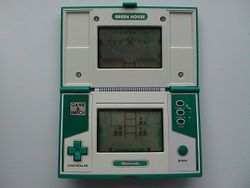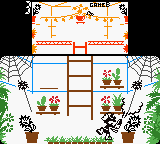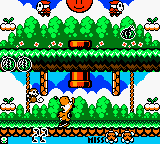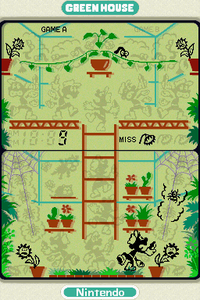Greenhouse
- This article is about the Game & Watch game. For other uses, see Greenhouse (disambiguation).
| Greenhouse | |||
|---|---|---|---|

| |||
| Developer | Nintendo Research & Development 1 | ||
| Publisher | Nintendo | ||
| Platform(s) | Game & Watch | ||
| Release date | December 6, 1982 | ||
| Genre | Platformer | ||
| Rating(s) |
| ||
| Mode(s) | Single player | ||
| Input | Game & Watch:
| ||
Greenhouse (released as Green House) is a dual-screen Game & Watch game released as part of the Multi Screen series on December 6, 1982.[1] It is the first game to feature Stanley, with the game served as the basis for the setting of Donkey Kong 3, which is why that title featured Stanley as the protagonist instead of Mario.[2] Greenhouse is featured in the Museum in Game & Watch Gallery 2. It was later remade for Game & Watch Gallery 3 with a Classic version and an updated "Modern" version.
The alarm indicator of this game is a cat that is located in the lower screen, beside the ladder, and a bee stings the cat when the alarm goes off.
Gameplay
Classic version
The player controls Stanley, and the objective is to spray inchworms and spiders that try to eat the flowers in a greenhouse. The inchworms crawl along vines on the top screen, while the spiders crawl along webs on the bottom screen, and the player has to try to hit them with a spray gun before they reach the flowers. A ladder connects the two parts of the game (which otherwise offer almost identical action). The player receives a point for killing an inchworm far from a flower, two points for an inchworm one step away from a flower, and three points for an inchworm closest to a flower. To kill the spiders, however, the player needs to spray them closest to a flower. If sprayed farther away, the spiders back away one step, giving the player a point. When the player kills a spider, they earn three points. As the game progresses, the inchworms and spiders move faster. If an inchworm or spider reaches a flower, the flower dies, earning the player a miss. If the player gets 300 points without any misses, all points are worth double until the player does get a miss. If the player has any misses at said score, all misses are canceled instead. When the player gets three misses, they receive a Game Over.
Modern version
In the Modern version of the minigame, an Orange Yoshi has to protect flowers by spraying Fly Guys and Grinders with watermelon seeds (as in Yoshi's Island). The tulip that releases Stars from Yoshi's Island releases the Fly Guys. In this version, a Warp Pipe connects the two parts of the game. The Yoshi earns a point for defeating a Fly Guy and three points for a Grinder. In addition to the points earned for defeating the enemies, the Yoshi also receives a point for eating every watermelon. Once the Yoshi grabs ten watermelons without getting a miss, he gains fire-spitting powers, allowing him to burn the ropes of the Grinders, scorching them even while they are shielded, and the Yoshi earns three points for defeating a Fly Guy. If a Fly Guy or Grinder reaches a flower, the enemy jumps on it and wilts it. At 200, 500, and 700 points, a heart appears for the Yoshi to remove a miss. Music is also featured in this version, with the tempo changing depending on the speed of the game.
However, in this version, the score and miss marks alternate positions depending on the section the Yoshi is standing on.
Controls
Classic version
: Move
: Spray
: Switch "main" screen
Modern version
: Move
and
: Attack
Game & Watch Collection
In the Nintendo DS game Game & Watch Collection, there is an exact port of Green House, alongside Donkey Kong and Oil Panic.
Gallery
Modern version
Trivia
- Stanley is referred to only as the "Fumigator" in the manual. He is named in print ads and commercials.[3][4]
- In the Super Smash Bros. series, Mr. Game & Watch uses the spray gun from this game as his jab attack.
- The timer has a maximum capacity of 19 minutes and 59 seconds.
- A commemorative edition of Green House was given to Nintendo employees for shipping 20 million Game & Watch units. This followed a commemorative edition of Egg given for shipping 10 million units.[5][6][7]
References
- ^ Greenhouse info page on In The Attic, a website dedicated to classic videogames (Internet Archive: Wayback Machine). Retrieved 13 November 2010.
- ^ interview with Shigeru Miyamoto from The Illustrated History of Electronic Games, transcribed on ZeldaDungeon As for the Donkey Kong 3, because the game was designed with another game called "Green House" for Game & Watch (Nintendo's early 80s handheld game series) in mind, we decided not to use Mario.
- ^ "There's MULTI SCREEN GREENHOUSE. With Stanley the Bugman fighting masses of creepy, crawly creatures." February 1983 Nintendo of America print ad. Retrieved October 5, 2021.
- ^ The Museum of Classic Chicago Television (www.FuzzyMemories.TV). (March 4, 2008). Nintendo Game And Watch (Commercial, 1983). YouTube. Retrieved September 13, 2020.
- ^ https://www.happy-today.org/nintendo/wanted.html
- ^ https://twitter.com/vectrex0904/status/729303068165087232
- ^ http://www5e.biglobe.ne.jp/kiden/densigame3/maborosi.htm
| Game & Watch games | ||
|---|---|---|
| Super Mario franchise | Donkey Kong (1982, MS) • Mario Bros. (1983, MS) • Mario's Cement Factory (1983, TT/NWS) • Mario's Bombs Away (1983, PS) • Donkey Kong Hockey (1984, MVS) • Super Mario Bros. (1986, CrS | 1987, Sp | 1988, NWS) • Mario the Juggler (1991, NWS) • Game & Watch: Super Mario Bros. (2020, CoS) | |
| Donkey Kong franchise | Donkey Kong (1982, MS) • Donkey Kong Jr. (1982, NWS | 1983, TT & PS) • Donkey Kong II (1983, MS) • Donkey Kong 3 (1984, MVS) • Donkey Kong Circus (1984, PS) • Donkey Kong Hockey (1984, MVS) | |
| Miscellaneous | Green House (1982, MS) | |
| MS: Multi Screen • TT: Table Top • PS: Panorama Screen • NWS: New Wide Screen • MVS: Micro VS. System • CrS: Crystal Screen • Sp: Special • CoS: Color Screen | ||














